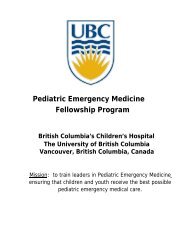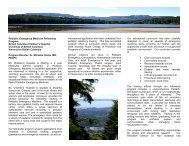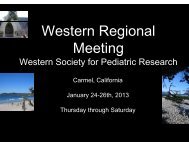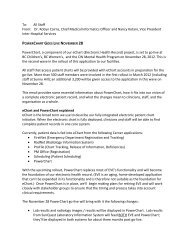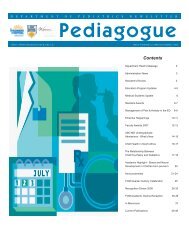UBC Department of Pediatrics Year 3 Student Orientation Manual
UBC Department of Pediatrics Year 3 Student Orientation Manual
UBC Department of Pediatrics Year 3 Student Orientation Manual
Create successful ePaper yourself
Turn your PDF publications into a flip-book with our unique Google optimized e-Paper software.
Past Medical History<br />
Birth/Pregnancy History<br />
For infants, this component is particularly important. Often birth/pregnancy history is either<br />
relevant to the chief complaint or represents the majority <strong>of</strong> the PMH. Make sure to include these<br />
questions on all infants and any child with a problem that might be related to perinatal/neonatal<br />
issues. We usually include this in all children.<br />
Maternal: mother’s age, gravida, para, health problems and medications<br />
Pregnancy: complications, prenatal care/labs/tests<br />
Labour: Duration <strong>of</strong> membrane rupture and complications<br />
Delivery: Gestational age (at a minimum whether term or premature), Mode (vaginal/C<br />
section/forceps/vacuum), Apgars and birth weight<br />
Neonatal: Duration <strong>of</strong> hospitalization and any events that occurred shortly after birth.<br />
Medical history<br />
Any medical problems or hospitalizations with a brief summary and dates<br />
Specifically ask about the last health supervision visit.<br />
Surgical history<br />
Any surgeries and dates<br />
Family history (include genogram)<br />
Explore any diseases that are in the family (e.g. hypertension, diabetes, or other problems resembling the<br />
child’s problem). Also gently explore any miscarriages or childhood deaths in the family. Ask about<br />
consanguinity. Family chart should be included.<br />
Social history<br />
Ask who lives in the home and whether there are other siblings and the state <strong>of</strong> the siblings’ health. Explore<br />
childcare arrangements—whether it is the family, an in‐home setting or center based (larger classrooms).<br />
Inquire about what languages are spoken at home. If the child is verbal, directly ask them about<br />
school/daycare, friends, and favourite past times/toys, pets and siblings/family members. Identify sources <strong>of</strong><br />
stress for the parents.<br />
Diet<br />
Description <strong>of</strong> diet: Particularly important in the first year <strong>of</strong> life or if growth is abnormal.<br />
Comment whether breast feeding or formula feeding (and what type <strong>of</strong> formula and how much) in infants.<br />
Ask about typical diet in older children or about concerns the parents may have.<br />
Important to ask how much milk and how much juice a child is drinking.



